https://github.com/marksmurphy/distributed-dig
A utility which makes DNS lookup requests across multiple DNS resolvers and collates the results.
https://github.com/marksmurphy/distributed-dig
address cli ddig distributed dns domain edns fqdn ip lookup resolution resolve resolver utility
Last synced: about 1 month ago
JSON representation
A utility which makes DNS lookup requests across multiple DNS resolvers and collates the results.
- Host: GitHub
- URL: https://github.com/marksmurphy/distributed-dig
- Owner: markSmurphy
- Created: 2019-09-16T10:33:51.000Z (over 5 years ago)
- Default Branch: master
- Last Pushed: 2023-06-05T18:09:45.000Z (almost 2 years ago)
- Last Synced: 2024-12-08T09:25:39.126Z (5 months ago)
- Topics: address, cli, ddig, distributed, dns, domain, edns, fqdn, ip, lookup, resolution, resolve, resolver, utility
- Language: JavaScript
- Homepage: https://www.npmjs.com/package/distributed-dig
- Size: 10.1 MB
- Stars: 2
- Watchers: 2
- Forks: 2
- Open Issues: 8
-
Metadata Files:
- Readme: README.md
- Changelog: CHANGELOG.md
Awesome Lists containing this project
README
# distributed-dig


[](https://www.codacy.com/gh/markSmurphy/distributed-dig/dashboard?utm_source=github.com&utm_medium=referral&utm_content=markSmurphy/distributed-dig&utm_campaign=Badge_Grade)


[](https://snyk.io/test/npm/distributed-dig)



## Quick Start
### Installation
**Install globally**:
```text
npm install -g distributed-dig
```
### Usage
**Lookup a single domain**:
```text
ddig domain
```
![`ddig [domain]`](https://marksmurphy.github.io/img/ddig.single.domains.gif)
---
## Overview
A utility which makes DNS lookup requests across multiple DNS resolvers and collates the results.
Useful for checking if a DNS record has been fully propagated, or for querying the origins behind an [AWS Route 53](https://docs.aws.amazon.com/Route53/latest/DeveloperGuide/dns-failover-types.html) / [Azure Traffic Manager](https://azure.microsoft.com/en-gb/services/traffic-manager/) record (*or any other DNS-based load balancing solution*).
---
## Installation
Installing globally is recommended:
```text
npm install -g distributed-dig
```
---
## Usage
```text
ddig domain [domain [domain] ...] [options]
```
---
## Options
The following options are available:
```text
--port Specify the DNS port [53]
--protocol Specify the DNS protocol [udp]
--timeout Specify the DNS timeout in milliseconds [2500]
--edns Enable or disable EDNS(0) [false]
--config Specify an alternative configuration file
--list-resolvers List resolvers configured in config file
--list-options List DNS request options configured in config file
--list-defaults Print json of default config file settings
--verbose Outputs more information
--no-color Switches off colour output
--version Display version number
--help Display this help
```
### port
Specify the TCP/UDP port tro use when connecting to the DNS resolver.
Default: `53`
### protocol
Specify whether to use UDP or TCP when connecting to the DNS resolver.
Default: `udp`
### timeout
Specifies the timeout in milliseconds to wait for a response from each DNS resolver.
Default: `2500` (*2.5 seconds*)
### edns
Enables [EDNS(0)](https://en.wikipedia.org/wiki/Extension_mechanisms_for_DNS)
Default: `false` (*disabled*)
With EDNS(0) enabled, if an upstream resolver doesn't support it then the standard DNS will be used as a fallback.
*Even though EDNS is support by ~90% of resolvers on the internet [^1], it is disabled by default in `ddig` as it may cause the resolver to return the IP address it considers closest to you, which is counter-productive to the purpose of querying many geographically distributed DNS resolvers.*
[^1]: [Internet Systems Consortium - Partial EDNS Compliance Hampers Deployment of New DNS Features](https://www.isc.org/blogs/partial-edns-compliance-hampers-deployment-of-new-dns-features/)
### config
Specifies an alternative configuration file.
To create a custom config you can:
1. pipe **--list-defaults** to a new file: `ddig --list-defaults > custom.json`
2. Edit `custom.json`
3. Use the new configuration file: `ddig --config [path]custom.json example.com`
### list-resolvers
Lists the resolvers configured in the `distributed-dig.json` config file:
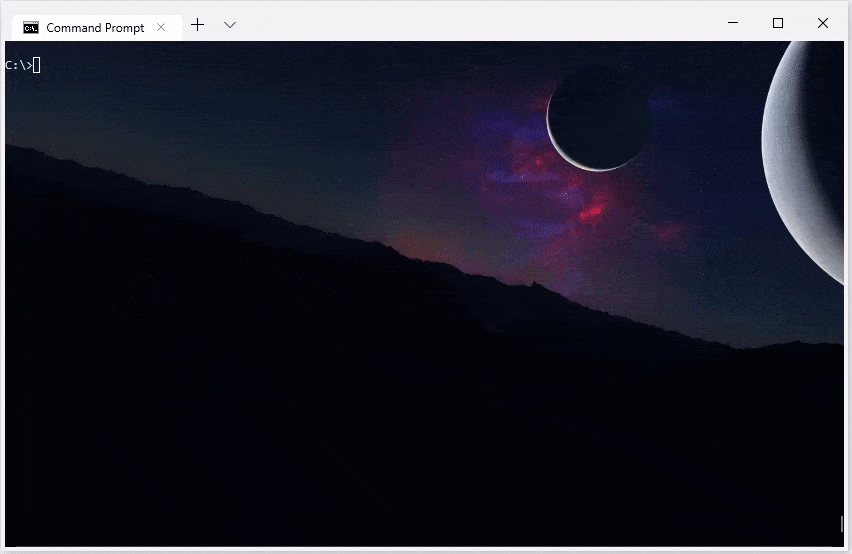
### list-options
Lists the options configured in the `distributed-dig.json` config file:
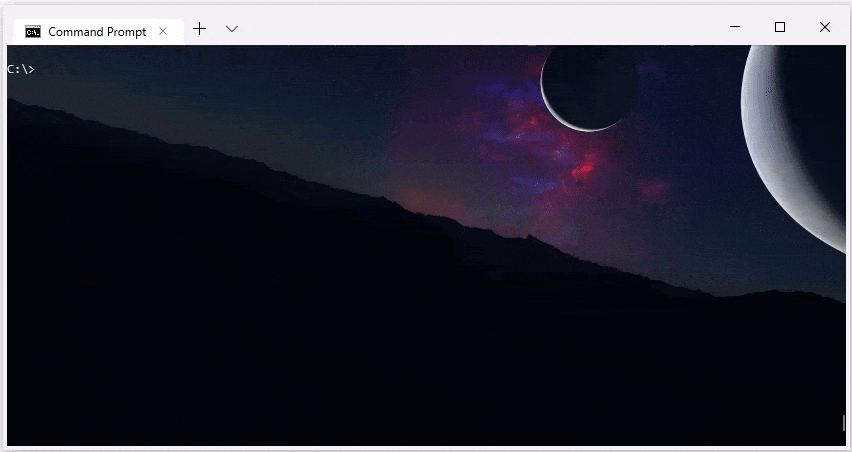
### list-defaults
Prints out a sample default config file in raw json. Pipe it to a file for an initial customised configuration file.
### verbose
Switches on verbose mode which outputs the following additional fields:
* Full recursive answer (i.e. nested `cname` records)
* Resolver IP Address
* Response time

`--verbose` also modifies the `--list-resolvers` and `--list-options` switches.
### no-color
If your terminal has problems rendering the colour output then you can switch it off by using `--no-color`.
### version
Prints out `distributed-dig`'s version number.
### help
Displays the help screen:
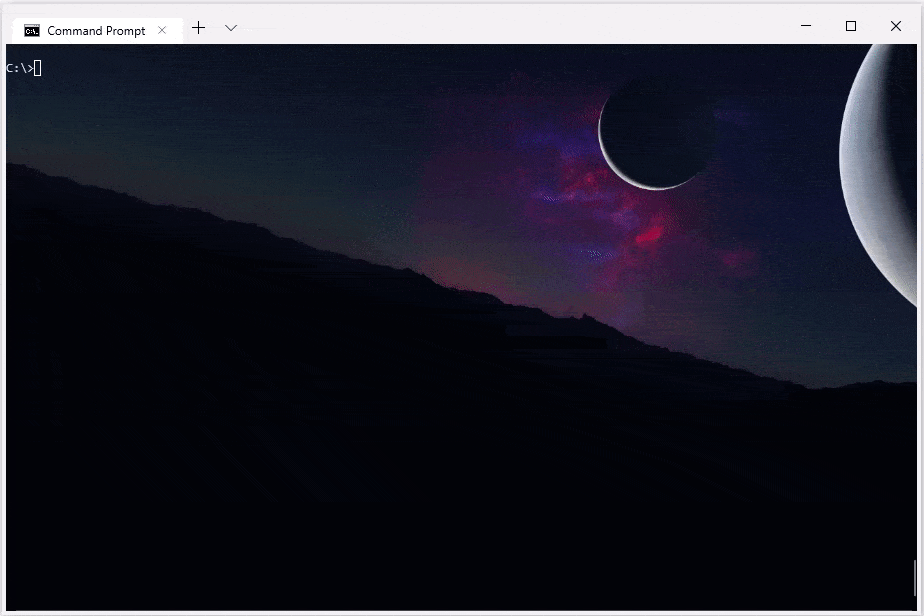
---
## Examples
### Lookup a single domain
* List the IP address returned for `www.asos.com` from each of the configured resolver:
```text
ddig www.asos.com
```
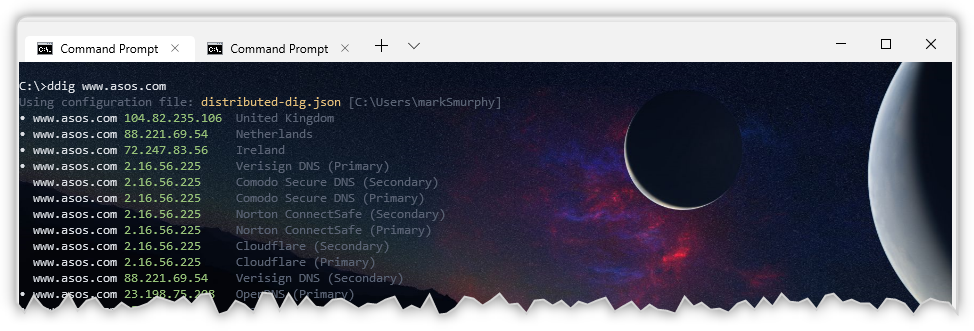
### Lookup a single domain with verbose enabled
* List the IP address and full recursive path returned for `www.asos.com` from each of the configured resolver:
```text
ddig www.asos.com --verbose
```
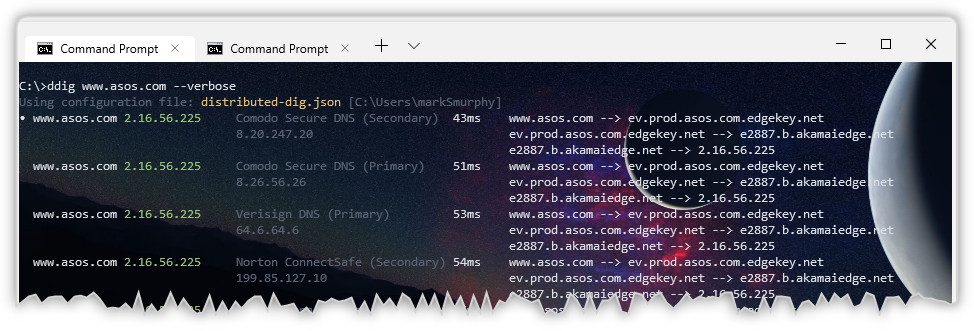
### Lookup multiple domains with an increased timeout
* List the IP addresses returned for both `www.asos.com` & `secure.asos.com` from each of the configured resolver with a 5 second timeout:
```text
ddig www.asos.com my.asos.com secure.asos.com --timeout 5000
```
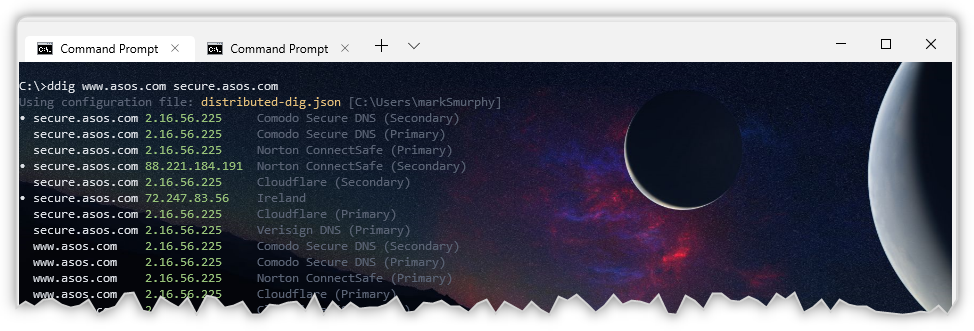
---
## Features
### Lookup a domain from a URL
As of version `1.8.0` you can provide a URL and the domain will be extracted. This is handy when performing a copy/paste from a browser's address bar.
```text
ddig https://example.com
```
![`ddig [URL]`](https://marksmurphy.github.io/img/ddig.single.url.gif)
### Unique IP Address Identifier
The first occurrence of each unique IP address is marked by a bullet point:
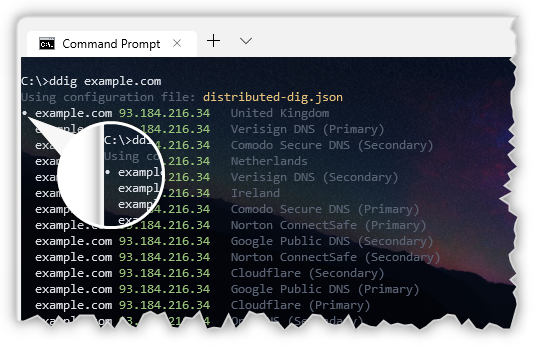
#### Unicode Support detection for Unique Address Identifier character
The bullet point character used is `U+2022 • BULLET (HTML •)`. If it is detected that the output is being piped (to a file or to `more` | `cat`) then the ascii character `42 * Asterisk (HTML *)`
#### Filtering out just unique addresses
As of version `1.7.0` there is an option to provide a `--unique` switch which lists only the first occurrence of each distinct IP address returned. N.B. *It will not filter out errors*
![`ddig [domain] --unique`](https://marksmurphy.github.io/img/ddig.single.domain.unique.gif)
### Column Width Warning
If you use the `--verbose` switch and have a terminal window that's narrower than 130 columns you'll see a warning:
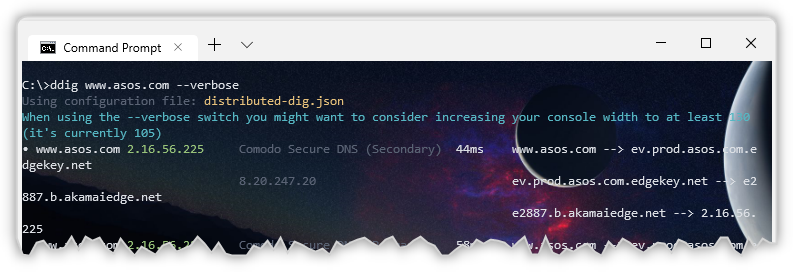
---
## Configuration File
All Options and Resolvers are configured in `distributed-dig.json` file. This file can exist in any of the following locations:
* The current working directory - `node -p process.cwd()`
* The home directory - `node -p require('os').homedir()`
* The application's root directory (i.e. the same directory as `distributed-dig.js`)
### Request Options
The default options are:
```json
"options": {
"request": {
"port": 53,
"type": "udp",
"timeout": 2500,
"try_edns": false,
"cache": false
},
"question": {
"type": "A"
}
}
```
### DNS Resolvers
Resolvers are configured in an array with each resolver having a `nameServer` element which should be the IPv4 or IPv6 address, and a `provider` element which is just a free-form text label:
```json
"resolvers": [
{
"nameServer": "208.67.222.222",
"provider": "OpenDNS (Primary)"
},
{
"nameServer": "208.67.220.220",
"provider": "OpenDNS (Secondary)"
},
{
"nameServer": "217.199.173.113",
"provider": "United Kingdom"
}
]
```
You can find a list of public DNS servers [here](https://public-dns.info/) and [here](https://dnspropagation.net/free-public-dns-servers/), and tailor the configured list for your own requirements.
---
## Debugging
`distributed-dig` uses the npm package [debug](https://www.npmjs.com/package/debug "www.npmjs.com"). If you set the environment variable `debug` to `ddig` you'll see full debug output.
### Windows
```text
set debug=ddig
```
### Linux
```text
DEBUG=ddig
```
### Powershell
```text
$env:debug="ddig"
```
---
## FAQ
* [Where is the Change Log?](#where-is-the-change-log)
* [What terminal/console are you using in the screen shots?](#what-terminal-are-you-using)
### Where is the Change Log
The `CHANGELOG.md` can be found [here](./CHANGELOG.md)
---
### What terminal are you using
I'm using Microsoft's new tabbed [Windows Terminal](https://github.com/microsoft/terminal) which has many excellent features, and the ability to [configure a background image](https://www.howtogeek.com/426346/how-to-customize-the-new-windows-terminal-app/).
---